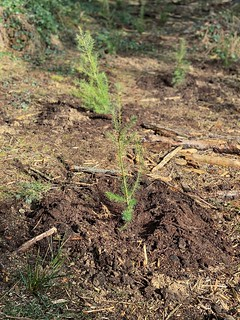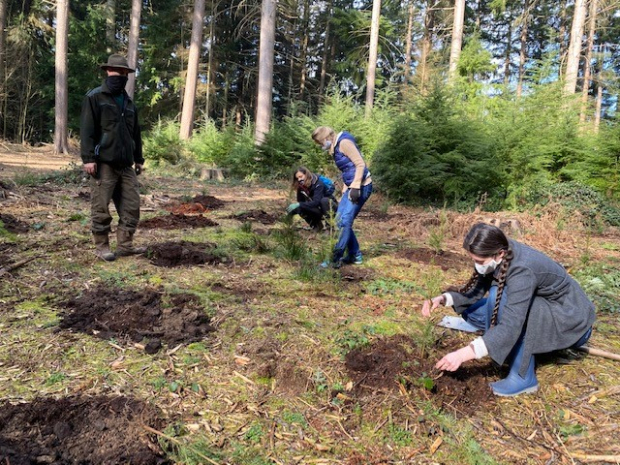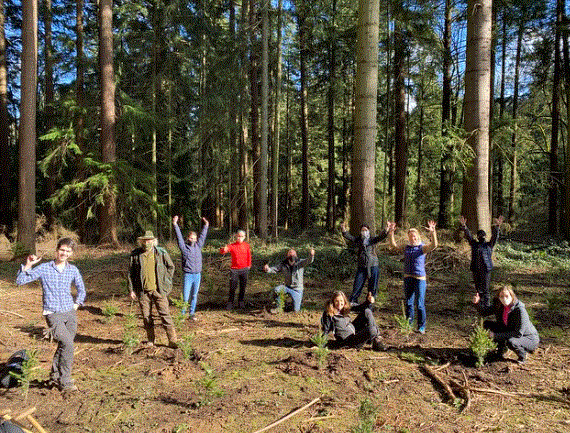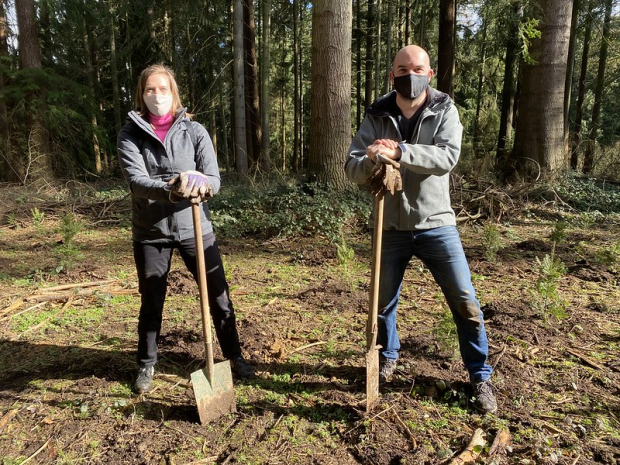Tree planting in Brussels
300 Trees Planted to Support Local Environment Close to Brussels

In the spirit of the Fifth United Nations Environment Assembly (UNEA-5) taking place virtually on 22 – 23 February on the theme of “Strengthening Actions for Nature to Achieve the Sustainable Development Goals”, the United Nations Environment Programme (UNEP) Office in Brussels supported local ecosystem restoration effortson 26 February. The team planted 300 new trees in the Geographic Arboretum of Tervuren just outside of Brussels in its resolution to aid the effort to restore this unique forest.
Boasting a collection of more than 30.000 trees and shrubs, the Arboretum contains more than 600 tree species, including many rare and threatened ones. The collection takes visitors on a journey through the trees of the world. Sadly, the impacts of climate are visible here too. Extreme weather conditions such as big storms, long-term droughts and heavy rainfalls, as well as other threats, like the rise of new parasites, have afflicted the forest, causing the loss of hundreds of trees. More threats are on their way.
The UNEA-5 concluded earlier that week with an urgent call to tackle the pressing planetary crisis: climate change, biodiversity loss and pollution; sending a clear message that we have to transform our relationship with the planet.
UNEP’s synthesis report Making Peace with Nature, launched in the margins of the Assembly, presents compelling scientific data on why we have to tackle the planetary crises. The report notes that the world’s forests constitute nearly a third of Earth’s land area. Almost ten percent of the global forest area has been lost through conversion to other land use since 1990. Human pressures have reduced intact forest landscapes by seven percent globally between 2000 and 2013.
We depend on forest resources for clear air and fresh water. Forests play also an essential role in the fight to stop climate change by absorbing and storing massive amounts of CO2 emissions. According to the FOREST EUROPE 2020, State of Europe’s Forests 2020 Report, European forests process as much as 155 million tonnes of carbon per year. However, wind, insects, ungulate browsing, and forest fires have damaged close to three percent of forests in Europe. Between 2010 and 2018, 19% of monitoring plots experienced a rise in foliage loss. Arboretums play a special role in the fight against climate change because of the diversity of trees from around the world that scientists can study there. These trees are a valuable resource for exploring and implementing nature-based solutions. Restoring forest ecosystems and developing nature-based solutions are goals of the United Nations Decade on Ecosystem Restoration, which will be in effect until 2030.
“We, of course, play our part,” said Veronika Hunt Šafránková, Head of UNEP Brussels Office, at the kickoff of the tree planting initiative. “As organizations, communities, and individuals, it is up to all of us to help rebuild our relationship with nature and to help stop climate change. By planting these young fir trees today, we are helping to improve the condition of the local forest area.”

The UNEP Brussels Team was joined by colleagues from the European Commission (DG Environment and DG Climate Action). They planted three different species of fir under the professional guidance of foresters from the Arboretum while respecting COVID-19 restrictions.
Contributing locally is a way we all can help influence the well-being our planet. You can find out more about UNEP’s work on forests on our website. We also invite you to take the tree planting and ecosystem restoration crash course, and join the International Day of Forests celebrations on 21st March themed ‘Forest restoration: a path to recovery and well-being.’
About the Geographic Arboretum of Tervuren
Situated in the municipality of Tervuren in the outskirts of Brussels, the Geographic Arboretum sits like a crown on the head of the majestic Sonian Forest. Countless trees and shrubs from the North, the West and the East of North America, from Central and Mediterranean Europe, from the Middle and Far East of Asia are grouped here by region of origin in some hundred sections, covering a total of 120 ha.
The arboretum was founded in 1902 on a property of King Leopold II and is today the most attractive public domain of the patrimony bequeathed by the king to the Belgian nation in 1903.
For more information see: https://arboretum-tervuren.be/

